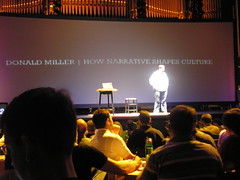Donald Miller was the first of the second session presenters. The second session was decidedly different from the first. Whereas the first seemed to be experts who set the tone for the key points of our conversation at Q, the second session felt much more pastoral. Perhaps the better was to synthesize it is that the first session was “here’s the story” and the second session was “here’s what my part of the story could be.”

Donald Miller did a great job at setting the tone for the following presenters, talking specifically about narrative and how stories effect us; specifically, how our personal story effect us.
Miller began by telling the story behind on of his yearly rituals: every year he spends time to sit down and literally decide what he’s going to spend the next year doing. What is your next year going to be about?
This past year he was struggling, however, as he couldn’t decide what it was he wanted to do for the first time. While he was still trying to figure it out, he received a call from a friend he’s known for years. He had once sent her a letter that described the things he wanted to accomplish in life. They talked about that letter and he discovered why he no longer knew what he wanted to do: he had accomplished all the he had once dreamed of. He needed a new story to take part in.
We as humans identify most with a three-act, single protagonist story. We are the single protagonist, and we need an antagonist. A few things he points out from this idea:
· The story becomes as important as the dream. If the protagonist dies, their dreams die. What is lost if the dream dies?
· If your ambition is evil, you are the villain.
· If your ambition is apathetic, you are a background character.
The problem he describes for the church today is that our story has been hijacked by a lesser story; the story of secular culture. For all the time we spend on “sacred” entertainment, we spend hours more on “secular” entertainment. We need to be a part of a better story.
Miller describes a friend whose daughter was dating a… less that appropriate suitor. Her life was going down a path the father did not approve of, but he didn’t know how to help her. When the family stumbled into an opportunity to help build and fund an orphanage in another country, the family rallied around the idea. The suddenly found a better story. Saving lives was such a better story to be in than rebelling against her father. The family found themselves in a better story, and better for it.
I think the psychological implications of story and narrative can run deep. I find myself agreeing greatly with Miller – I wish he had taken the ideas further. I don’t think that the church has been simply hijacked by a lesser story; I think most churches don’t have a story.
In Kevin Kelly’s presentation he made the “controversial” statement that we have to consider the possibility that Armageddon won’t happen in our lifetime. That there are other options for what will happen in the year 2100, 2200, or even 3100. So many churches have grown lazy because there is no greater story; they don’t know about social injustices like slave trading or environmental issues that will affect their children’s children. And so, the biggest story their church is caught up in is the color of the carpet.
So many churches have dissention because their pastor has not given them a better story to be a part of. Every story needs an antagonist; if the church isn’t aware of opportunities to change culture for the better, if they aren’t aware of the movements of Satan, they can easily lose sight of who their antagonist is. In a culture where the greatest antagonist is “the man,” then if the church has no other antagonist the first, and easiest, person to see as the villain is the pastor.
If the pastor hasn’t given his church a better story to be a part of, his people will turn on him or leave.
Big churches can get by on the story of being part of something big. Church plants can get by on the story of being part of something new. Aging churches can get by on the story of being a resting place before they die.
Or, we can have a better story. What is your church’s story?
